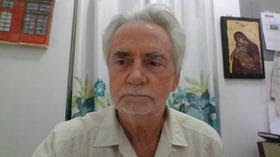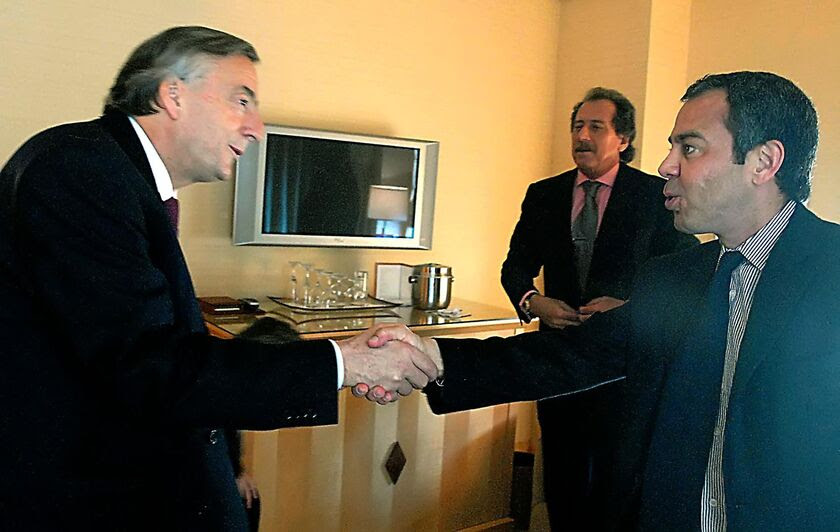NICOLE WINFIELD and MARÍA VERZA
February 17, 2020
MILAN (AP) — The cardinal’s response was not what Yolanda Martínez had expected — or could abide.
Her son had been sexually abused by a priest of the Legion of Christ, a disgraced religious order. And now she was calling Cardinal Valasio De Paolis -- the Vatican official appointed by the pope to lead the Legion and to clean it up -- to report the settlement the group was offering, and to express her outrage.
The terms: Martínez’s family would receive 15,000 euros ($16,300) from the order. But in return, her son would have to recant the testimony he gave to Milan prosecutors that the priest had repeatedly assaulted him when he was a 12-year-old student at the order’s youth seminary in northern Italy. He would have to lie.
The cardinal did not seem shocked. He did not share her indignation.
Instead, he chuckled. He said she shouldn’t sign the deal, but should try to work out another agreement without attorneys: “Lawyers complicate things. Even Scripture says that among Christians we should find agreement.”
The conversation between the aggrieved mother and Pope Benedict XVI’s personal envoy was wiretapped. The tape — as well as the six-page settlement proposal — are key pieces of evidence in a criminal trial opening next month in Milan. Prosecutors allege that Legion lawyers and priests tried to obstruct justice, and extort Martínez’s family by offering them money to recant testimony to prosecutors in hopes of quashing a criminal investigation into the abusive priest, Vladimir Reséndiz Gutiérrez.
Lawyers for the five suspects declined to comment. The Legion says they have professed innocence. A spokesman said that at the time, the Legion didn’t have in place the uniform child protection policies and guidelines that are now mandatory across the order.
De Paolis is beyond earthly justice — he died in 2017 and there is no evidence he knew of, or approved, the settlement offer before it was made. But the tape and documents seized when police raided the Legion’s headquarters in 2014 show that he had
turned a blind eye to superiors who protected pedophiles.
In addition, the evidence shows that when De Paolis first learned about Reséndiz’s crimes in 2011, he approved an in-house canonical investigation but didn’t report the priest to police. And when he learned two years later that other Legion priests were apparently trying to impede the criminal investigation into his crimes, the pope’s delegate didn’t report that either.
And a few hours after he spoke with Martínez, De Paolis opened the Legion’s 2014 assembly where he formally ended the mandate given to him by Benedict to reform and purify the religious order. The Legion had been “cured and cleaned,” he said.
In fact, his mission hadn’t really been accomplished.
___
Benedict had entrusted De Paolis, one of the Vatican’s most respected canon lawyers, to turn the Legion around in 2010, after revelations that its founder, the late Rev. Marcial Maciel, had raped his seminarians, fathered three children and built a cult-like order to hide his crimes.
There had been calls for the Vatican to suppress the Legion. But Benedict decided against it, apparently determining in part that the order was too big and too rich to fail. Instead, he opted for a process of reform, giving De Paolis the broadest possible powers to rebuild the Legion from the ground up and saying it must undergo a profound process of “purification” and “renewal.”
But De Paolis refused from the start to remove any of Maciel’s old guard, who remain in power today. He refused to investigate the cover-up of Maciel’s crimes. He refused to reopen old allegations of abuse by other priests, even when serial rapists remained in the Legion’s ranks, unpunished.
More generally, he did not come to grips with the order’s deep-seated culture of sexual abuse, cover-up and secrecy — and its long record of avoiding law enforcement and dismissing, discrediting and silencing victims. As a result, even onetime Legion supporters now openly question his reform, which was dismissed as ineffective by the Legion’s longtime critics.
“They always try to control victims, minimize them, defame them, accuse them of exaggerating things,” said Alberto Athié, a former Mexican priest who has campaigned for more than 20 years on behalf of clergy sexual abuse victims, including victims of the Legion.
“Then, if they don’t achieve that level of control, they go to the next level, looking for their parents, trying to minimize them or buy them off, silence them. And if that doesn’t work, they go to trial and try to do what they can to win the case,” he said.
Now, victims of these other Legion priests are coming forward in droves with stories of sexual, psychological and spiritual abuse, and how the Legion’s culture of secrecy and cover-up has remained intact.
“They say they’re close to the victims and help their families,” Martínez told The Associated Press at her home in Milan. “My testimony is this didn’t happen.”
___
Martínez, a 54-year-old mother of three, chokes up when she recalls the day she received the phone call from her son’s psychologist. It was March of 2013, and her eldest son had been receiving therapy on the advice of his high school girlfriend. Martínez thought she was about to learn that she would be a grandmother; she thought her boy had gotten the girl pregnant.
Instead, Dr. Gian Piero Guidetti told Martínez and her husband that during therapy, their son had revealed that he had been repeatedly sexually molested by Reséndiz starting in 2008, when he was a middle schooler at the Legion’s youth seminary in Gozzano, near Italy’s border with Switzerland. Guidetti, himself a priest, told them he was required by his medical profession to report the crime to prosecutors.
His complaint, and the testimony of Martínez’s son, sparked a criminal investigation that resulted in Reséndiz’s 2019 conviction, which was upheld on appeal in January. Resendiz, 43, who was convicted in absentia and is believed to be living in his native Mexico, has until the end of March to appeal the conviction and 6 1/2-year prison sentence to Italy’s highest court. His lawyer, Natalia Curro, said an appeal is being considered, and said her client denied having abused Martinez’s son, though he admitted to abusing another boy.
The investigation, however, netted evidence that went far beyond Reséndiz’s own wrongdoing. Documents seized by police and seen by AP in the court file showed a pattern of cover-up by the Legion and the pope’s envoy that stretched from Milan to Mexico, the Vatican to Venezuela and points in between.
Personnel files, for example, made clear Resendiz was known to the Legion as a risk even when he was a teenage seminarian in the 1990s, yet he was ordained a priest anyway in 2006 and immediately sent to oversee young boys at the Gozzano youth seminary.
“He’s a boy with strong sexual impulses and low capacity to control them,” Reséndiz’s novice director, the Rev. Antonio León Santacruz, wrote in an internal assessment on Jan. 9, 1994. “Given his psychological character, he’s inclined to not respect rules without great difficulty and the psychologist thinks it will be difficult for him to undertake consecrated life given he has little respect for rules. He follows them as long as he’s being watched, but as soon as he can, he breaks them and has no remorse.”
A year later, on Reséndiz’s 19th birthday, the seminarian wrote a letter to Maciel -- addressing it as all Legionaries addressed the man they regarded as a living saint: “Nuestro Padre,” “Our Father.”
“I’m having various problems in the field of purity and the truth is I’m having a hard time, because temptations are coming to me,” he wrote. “I’m praying to the Holy Virgin every day for grace and asking her for strength to not offend again; I say again because I have had the disgrace of falling, but with the help of God I will fight to form that pure, priestly heart.”
When Martínez saw such letters in the court file, her heart fell.
“My son wasn’t even born yet,” she said. “How can you put someone like that in charge of a seminary?”
A Legion spokesman, the Rev. Aaron Smith, said the Legion has overhauled its training process for seminarians since Reséndiz’s era, applying more scrutiny before ordination.
“Things are different today,” he said in emailed response to questions.
___
While Milan prosecutors first heard about Reséndiz’s pedophilia in March 2013 when the therapist reported it, the crimes were old news to both the Vatican and the Legion.
The Legion has admitted it received a first report of abuse by Resendiz on March 6, 2011, from another boy who had been a student at Gozzano. The Legion says that boy, an Austrian, had first told a Legion priest of Reséndiz’s abuse. That priest recommended he report it to a church ombudsman’s office in Austria that receives abuse complaints, which he did, Smith said.
Separately, the Legion got wind of another possible victim in Venezuela, where Reséndiz had been sent from Gozzano in 2008, after he abused Martínez’s son.
Italian police were never informed by the Legion or the Vatican. Neither the Vatican nor Italy requires clergy to report suspected child sex abuse.
When police finally did get wind of the case in March 2013, they uncovered elaborate efforts to keep Reséndiz’s crimes quiet. According to one email seized by Italian police — written March 16, 2011, or 10 days after the Austrian claim was first received by the order — a Legion lawyer recommended to one of the Legion’s senior behind-the-scenes bureaucrats, the Rev. Gabriel Sotres, that a Legion priest visit with the victim in Austria.
The aim of the visit, prosecutors wrote in summarizing the email exchanges, “was to speak to the (victim’s) older brother and convince him to not tell their parents and not go to police because this could cause serious problems not only for the Legion but also Father Vladimir, all the other priests involved and the victim and his family.”
Smith, the Legion spokesman, didn’t deny the prosecutors’ account but said that “encouraging a child to keep something from their parents or guardians is contrary to our code of conduct.”
Later in 2011, the Legion arranged for Reséndiz to be transferred from Venezuela to Colombia, and prepared a legal strategy to limit the possible damage if the Venezuelan case escalated. The emails were sent to several Legion leaders, including Sotres, who remain in top positions today. In fact, in the Legion’s current leadership assembly under way in Rome to choose new superiors and priorities, at least 13 of the 89 participating priests or their substitutes were involved in some way in dealing with the Reséndiz scandal, fallout and cover-up, including two priests who are defendants in the upcoming Milan trial.
According to the seized emails, the plan proposed by a Legion lawyer involved reporting only Reséndiz’s name to Venezuelan police to comply with local reporting laws, leaving out that he was a priest, that he was accused of a sex crime against a child, and the name of the Legion, prosecutors said in summarizing the emails. The report would also note that he no longer lived in Venezuela.
The Legion has said Reséndiz was removed from priestly ministry and from his work with young people in Venezuela within days of receiving the initial Austrian report.
But the emails seized indicate that the restrictions weren’t necessarily enforced: One from Dec. 20, 2012, suggests that Reséndiz was hearing confessions in schools and celebrating Mass in Colombia, news that prompted the leadership to ultimately recommend he be sent for psychological counseling in Mexico and later assigned to an administrative position “where they don’t know his situation.”
Eventually, as part of the church’s in-house investigation, Reséndiz confessed — but only to the Legion and Vatican authorities, and only about other boys he abused, not Martínez’s son.
“I sincerely recognize my terrible behavior as a priest,” he wrote the Vatican official in charge of the sex crimes office in 2012, Cardinal Gerhard Mueller. “Truly I lived in hell when these sad facts occurred. I recognize the gravity of the acts that I committed and I humbly ask the church for forgiveness for these sad and painful facts. I can’t understand how it could have happened, and I recognize that I lacked the courage to admit to the problem and advise my superiors of the danger.”
The Vatican defrocked him on April 5, 2013 -- just a few weeks after Italian prosecutors first heard about Martínez’s son.
By October of that year, the Legion was nearing the end of De Paolis’ mandate and clearly wanted to avoid the possibility that the Reséndiz case could explode publicly and jeopardize the plan to resume their independence from the Vatican.
Martínez and her family, for their part, were coping with the trauma of her son’s abuse.
“He would have nightmares. He wouldn’t let me touch him ...,” Martínez said. “He couldn’t stand anyone being close to him.”
Once, he was even prevented from throwing himself in front of a subway train.
Martínez had been in regular touch with the Legion priest closest to the family, the Rev. Luca Gallizia, her husband’s spiritual director. He was serving as the family’s contact with the Legion, after all other priests and members of Martínez’s Regnum Christi social circle severed contact -- apparently on orders from the leadership.
Gallizia traveled to Milan to meet with Martínez on Oct. 18, 2013, bringing a proposed settlement to compensate the family. They met in a room off the parish playground of the Sant’Eustorgio basilica where Martínez worked.
When Martínez read it later that night with her husband, she was shocked.
“It was a second violation, because for all intents and purposes in that letter, they asked us to deny the facts. And for us it was a stab in the back because it was brought to us by our spiritual father. ... He knew everything about us, because my husband confided in him. And that made it even more painful.”
The Legion declined to comment on the proposed settlement, citing the upcoming trial.
The document the Legion wanted Martínez’s family to sign states that her son ruled out having been sexually abused by Reséndiz and regardless didn’t remember. It said he denied having any phone or text message contact with him, and that his ensuing problems were due to the fact that he left the seminary and was having trouble integrating socially into his new public high school.
The document set out payments for the son’s continuing education and therapy and required “absolute” secrecy. If the family were called to testify, they were to make the same declarations as contained in the settlement -- denying the abuse.
A few months later, the Legion realized it had erred in leaving the proposal with Martínez and proposed a revised settlement acknowledging the abuse occurred. Now, though, it required the family to pay back double the 15,000 euro ($16,300) settlement offer if they violated the confidentiality agreement.
It was then that Martínez called De Paolis.
“Both my lawyer and I, our jaws dropped,” she told the Vatican cardinal.
The pope’s envoy said he was surprised as well.
“Yes, but this, this is how it’s done in Italy,” he said.
The mother would have none of it. “It’s not a very nice agreement, signing a lie,” Martínez told the cardinal. “Aside from the fact that I don’t want any money, I’m not signing the letter.”
___
María Verza contributed to this story from Mexico City.
https://apnews.com/8d0cb3ef1cfa0be61378b949811d8c17












